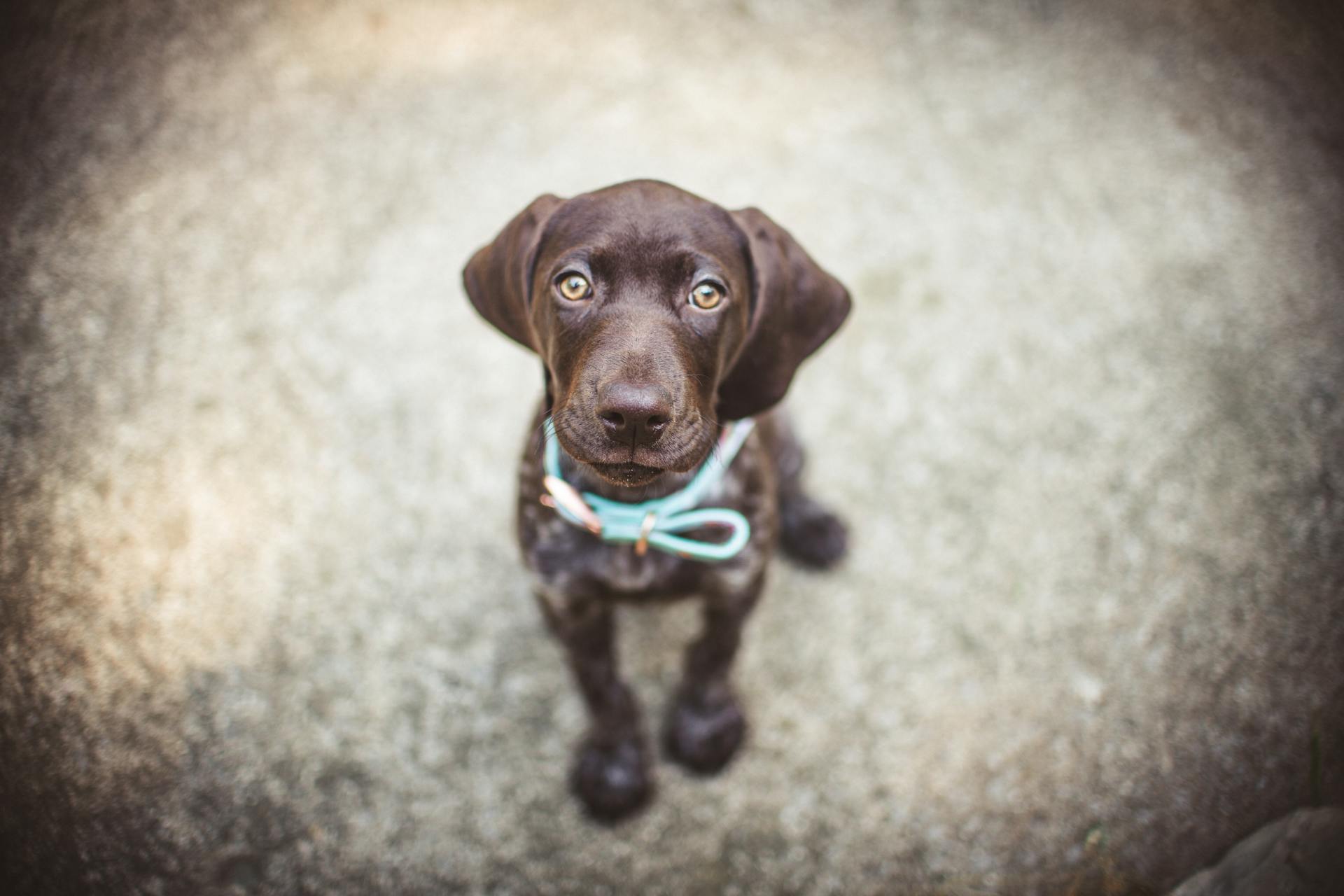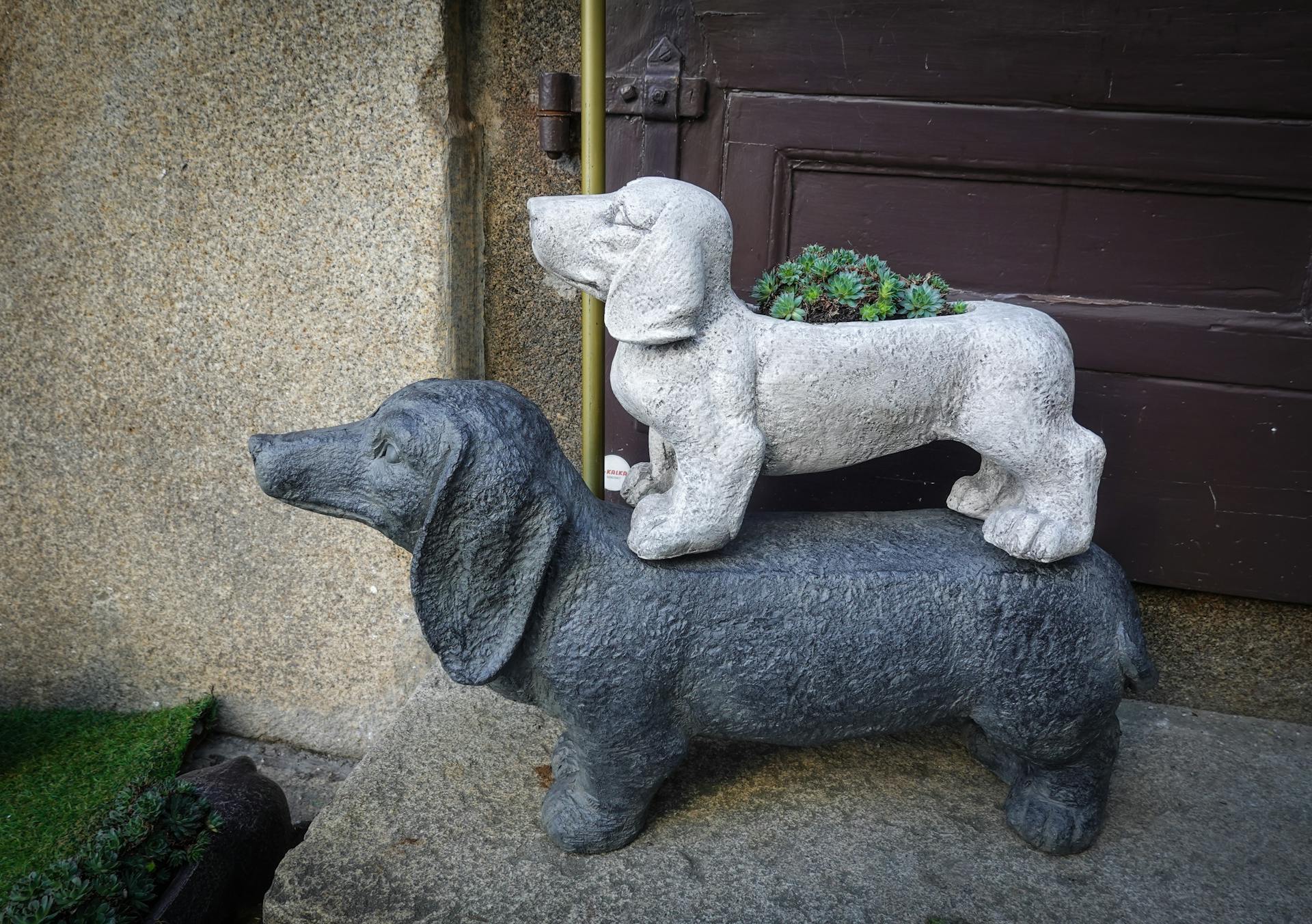
Full-grown mini Dachshunds are a unique breed, known for their short stature and long bodies. They typically weigh between 11 and 16 pounds.
Their short legs can make them prone to back problems, but with proper care and exercise, they can live a happy and healthy life. Regular exercise and a balanced diet are crucial to maintaining their physical health.
Mini Dachshunds are a relatively small breed, but they have big hearts and can be quite energetic. They require regular playtime and mental stimulation to prevent boredom and destructive behavior.
On average, full-grown mini Dachshunds reach their full height between 6 and 9 months of age, but they may continue to fill out and gain weight until they are 1-2 years old.
Suggestion: How Much Exercise Do Dachshunds Need
Dachshund Care
Full grown mini dachshunds require mental stimulation and physical activity each day. A daily routine that includes at least an hour of activity is essential.
Their grooming needs are fairly straightforward, depending on their coat type. Mini dachshunds should receive early and consistent training and socialization to ensure good behavior.
Plan on at least an hour a day of activity, including moderate-length morning and evening walks plus vigorous playtime. This can help to burn mental energy and keep your dog happy and healthy.
Puzzle toys and dog sports, such as tracking, can be great ways to keep your mini dachshund's mind engaged. Always keep your dog on a leash or in a securely fenced area when outside.
Their high prey drive can cause them to run off quickly if they see a small animal or other perceived prey. Be aware that they often enjoy digging and might burrow under fences if you're not watching them.
Aiming to prevent your dachshund from jumping on and off furniture or racing up and down stairs is crucial to prevent back injuries. This can be achieved by providing a safe and stable environment for your dog to play and relax in.
Nutrition and Health
As a mini dachshund owner, you want to make sure your furry friend is getting the right nutrition to stay healthy. Dachshunds need a nutritionally balanced canine diet, typically fed in two measured meals per day. Fresh water should always be accessible.
It's essential to discuss the type and amount of diet with your vet to ensure your dachshund doesn't become overweight. Obesity can put too much strain on their long back, leading to disc problems. Dachshunds are prone to obesity due to their small legs.
To prevent obesity, be mindful of treats and other extra food. Your vet can help you determine the best way to help your dachshund lose weight if they're already overweight.
Common Health Problems
Dachshunds are prone to back problems due to their elongated spine, which can lead to disc damage similar to a slipped disc in humans.
Their poor air flow in the ears can cause ear infections, especially if their ears hold moisture. This is a common issue in mini dachshunds.
To keep your dachshund healthy, it's essential to monitor their weight. A dachshund is considered obese if they weigh more than 15% of their ideal weight.
Obesity is a significant problem in dachshunds due to their small legs, which can make it difficult for them to exercise and maintain a healthy weight.
Here are some common health issues to watch out for in dachshunds:
- Disc damage and back problems
- Ear infections
- Obesity
Diet and Nutrition
Having fresh water accessible is crucial for your dachshund's health. Always provide a nutritionally balanced canine diet, typically via two measured meals per day. Discuss the type of diet and amount with your vet to ensure your dachshund stays healthy.
Dachshunds are prone to obesity, so it's essential to be mindful of treats and extra food. Excess weight can put too much strain on their long back, leading to disc problems. This is why it's crucial to monitor their weight and adjust their diet accordingly.
To keep your dachshund at a healthy weight, aim for two measured meals per day. Avoid overfeeding, as this can lead to obesity and related health issues. Regular check-ins with your vet will help you determine the best diet for your dachshund.
Here are some key points to keep in mind when it comes to your dachshund's diet:
- Feed a nutritionally balanced canine diet.
- Provide two measured meals per day.
- Monitor weight and adjust diet accordingly.
- Avoid overfeeding to prevent obesity.
Being mindful of treats and extra food is also vital. A dachshund is considered obese if they weigh more than 15% of what they should weigh. Regular exercise and a balanced diet will help keep your dachshund in top shape.
If My Pet Is Losing Weight
If your pet is losing weight, it's essential to investigate the cause as soon as possible. Weight loss can be a side effect of many different illnesses and diseases, some of which are more serious than others.
If your pet is being fed high-quality dog food and isn't overweight, take them to the veterinarian to get checked.
Weight loss isn't always intentional, and it's crucial to rule out any underlying health issues.
What is a Rabbit?
A rabbit dachshund, also known as a 'toy' or 'teacup' dachshund, weighs less than 8 pounds as an adult.
These small dogs are bred for hunting smaller prey, like rabbits, and are recognized by the World Canine Federation.
They measure just 30.5 cm around their chest as adults, which is significantly smaller than the standard dachshund size.
If you see a rabbit dachshund for sale, it's better to steer clear, as there's limited information available about this breed.
Dachshunds come in different sizes, including miniature and standard, which are recognized by the UK and US breed standard.
Discover more: Full Grown Standard Poodle
Size and Growth
A full-grown mini dachshund typically weighs less than 11 pounds and measures 5-6 inches in height. Their height is measured from the ground to the top of their shoulder blades, also called the withers.
Miniature dachshunds are significantly smaller than standard dachshunds, weighing about half the size and weight. They generally weigh 10 pounds when 12 months or older and have a chest circumference of 35.5 cm (14 inches).
Here's a rough guide to a mini dachshund's weight at different life stages:
If you're unsure whether your puppy is a miniature or standard dachshund, you can tell from their size once they're about 12 months old and closer to their adult size.
You might like: Wiener Dog Size
Miniature Pets
Miniature Dachshunds are extremely loving and eager to please, making them phenomenal pets for many people.
They do well with other pets, especially dogs, but you do need to be careful with smaller pets because of a Dachshund's hunting instincts.
You also need to be careful with them around smaller children, as they don't always realize their small size and could be accidentally hurt by falling on them.
For more insights, see: Do Long Haired Dachshunds Need Haircuts
Miniature Pets

Miniature pets can be a great fit for many families, but it's essential to consider their needs and personalities. They're extremely loving and eager to please, making them a joy to have around.
Miniature Dachshunds, in particular, do well with other pets, especially dogs. However, you need to be careful with smaller pets due to their hunting instincts.
Their small size can also be a concern, especially around smaller children and larger dogs. Mini Dachshunds often don't realize they're small, which can lead to problems with smaller children who could fall on them or larger pets that could trample them.
Consider reading: Are Dachshunds Good for Apartments
What is a Tweenie?
A "tweenie" dachshund is an in-between size, not quite big enough to be a standard dachshund and not small enough to be miniature.
They typically weigh between 11 and 16 pounds, which is a pretty sweet spot for many owners.
This size isn't officially recognized by breed standards, but it's a popular choice for owners who love the mix of the two sizes.
If your dachshund falls into this weight range, they're probably a tweenie!
Take a look at this: What Size Crate for Mini Dachshund
Frequently Asked Questions
What are the cons of a Miniature Dachshund?
Dachshunds are prone to back-related issues due to their physical structure, which can lead to mobility loss and paralysis. Regular veterinary check-ups and a healthy lifestyle are crucial to mitigate these risks
Featured Images: pexels.com


